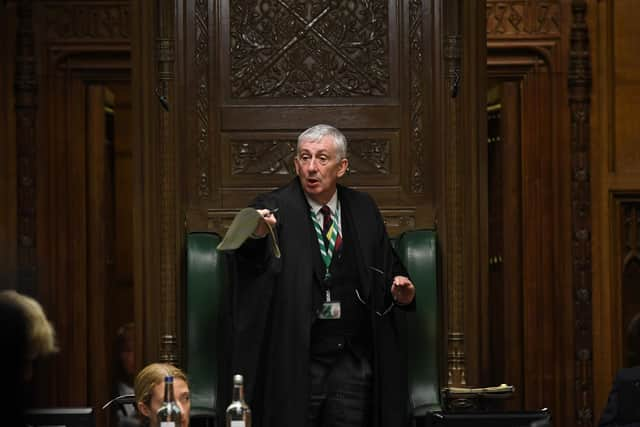Lindsay Hoyle analysis: What happened in Parliament last night and why it's depressing to watch
Wednesday’s hours of political games in Westminster will only entrench this view, with MPs acting with all the grace and class of a baby throwing up during a state banquet.
It all began with an opposition-day debate on a motion on the Israel-Gaza conflict, written by the SNP in what they admit was an attempt to embarrass the Labour Party by dividing its MPs.
Advertisement
Hide AdAdvertisement
Hide AdLabour and the Government then suggested their own amendments in an alternative wording to suit their own political aims.


After discussions (or unacceptable political pressure, depending on who you ask) between Labour and the Commons Speaker Sir Lindsay Hoyle, he decided to allow MPs to first vote on Labour’s motion, rather than the SNP’s.
The speaker said this was to allow MPs of all sides to “express their views” after concerns about the safety of politicians, with thousands of pro-Palestine protesters outside Parliament. The SNP and the Conservatives said this was a political move aimed at saving the Labour Party’s blushes.
This move made the SNP feel like were robbed of their moment in the sun, and denied their opportunity to complete their expressed aim of embarrassing the Labour Party.
Advertisement
Hide AdAdvertisement
Hide AdWilliam Wragg, a backbench Tory MP whose commitment to Parliament is so unwavering that he is standing down at the next election, then proposed a motion expressing no confidence in the Speaker, which has now been backed by more than 50 Tory and SNP MPs.
Conservative and SNP politicians promptly walked out of the debate, meaning Labour’s amendment passed. This amendment will have no impact on the Israel-Gaza conflict, just as it had if the SNP had got their way.
Similarly this will not change the disdain with which the public view the political games played in Westminster.
A motion calling for a ceasefire is symbolic. It is meant to be a meaningless but well-meaning affirmation of sorrow for the innocent lives lost in the region, and a plea for a future without violence where possible.
Advertisement
Hide AdAdvertisement
Hide AdYesterday’s actions in Westminster were indeed symbolic, but symbolic of exactly the lack of duty, respect and temperament which the public associates with the politics of 2024 in Britain.
On a question of the deaths of children in a conflict that no side can see an end to, within the region or out, politicians were more concerned with embarrassing one another than doing anything approaching appropriate.
It is unsurprising and depressing in equal measure.
Many in the UK do not know how to feel about the conflict in Gaza, many more have little to no view at all. There will likely be no consensus in Britain on this question, inside Parliament or at the country at large.
Last night’s actions in Parliament do feed into a different consensus, that politics can be better than what the one which we are lumbered with, but the jury is out on when or if that will come to pass.
Comment Guidelines
National World encourages reader discussion on our stories. User feedback, insights and back-and-forth exchanges add a rich layer of context to reporting. Please review our Community Guidelines before commenting.